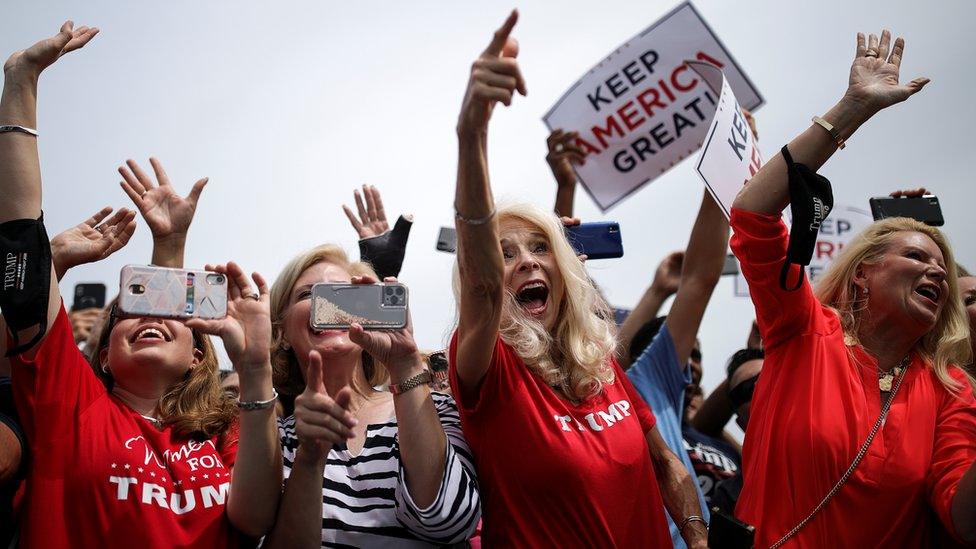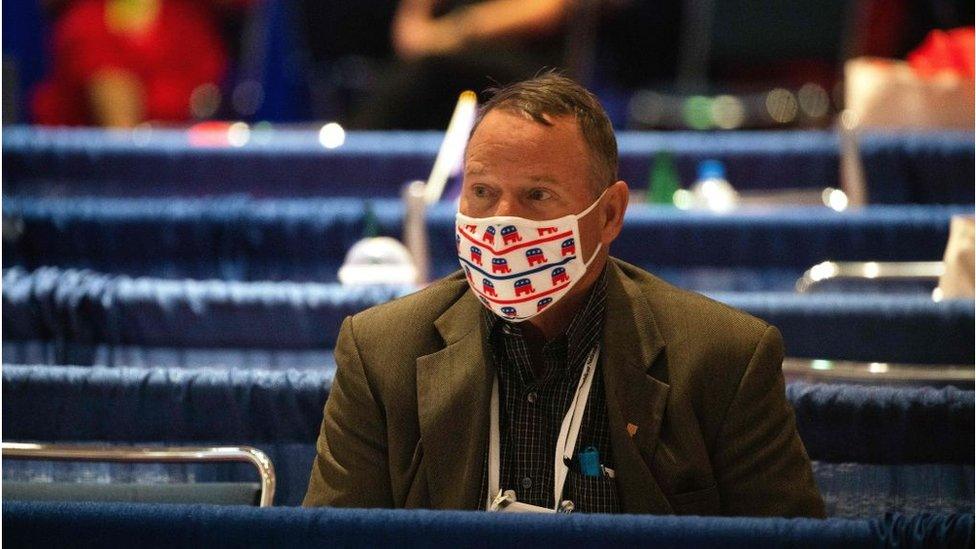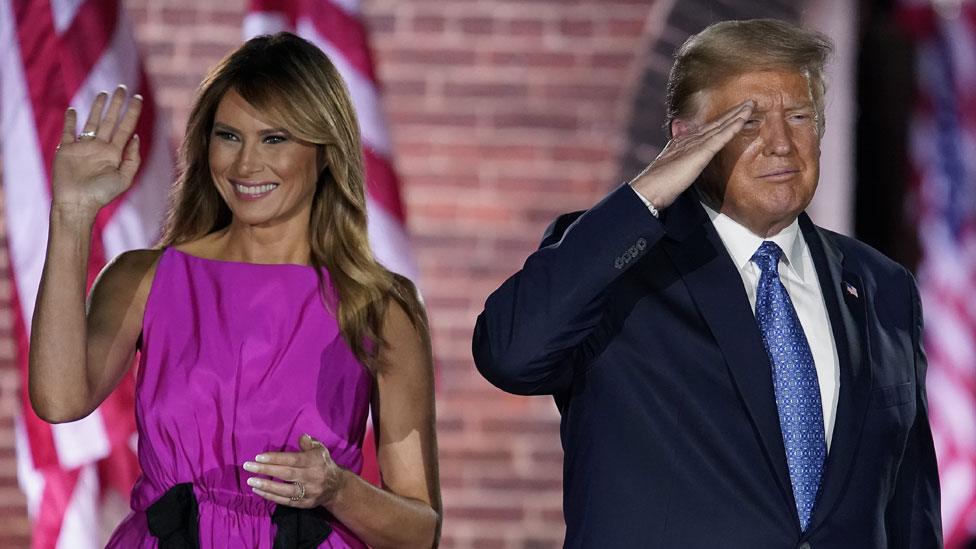RNC 2020: Trump warns Republican convention of ‘rigged election’
- Published
Donald Trump: "This is the greatest scam in the history of politics"
US President Donald Trump has warned his fellow Republicans their opponents may "steal" November's election, as his party anointed him as their candidate.
"They're using Covid to defraud the American people," Mr Trump told delegates on the first day of the party convention in North Carolina.
He repeated an untrue claim that mail-in ballots could lead to voter fraud.
An unprecedented number of Americans are expected to vote by mail as a result of the coronavirus pandemic.
Experts and voting officials have dismissed the claim that mail-in voting leads to fraud as a false conspiracy theory.
Mr Trump himself uses the system regularly.
Opinion polls suggest he is lagging behind Democratic challenger Joe Biden.
Mr Biden, the former vice-president to Barack Obama, has boasted a 10-point lead on occasions.
Addressing delegates in person at a party conference that has been dramatically scaled back by the coronavirus pandemic, Mr Trump accused Democrats of "using Covid to steal an election".
"The only way they can take this election away from us is if this is a rigged election," he said. "We're going to win."
Mr Trump had also warned of a "rigged" election in 2016, as he trailed Hillary Clinton in the polls.
But in 2016 the polls were far less clear and just a few percentage points separated Mr Trump and his then-rival Hillary Clinton at several points as election day neared.
'My father's entire worldview is that we can always do even better'
On Monday, Mr Trump was officially nominated as a formality to be the Republican nominee at his party's convention in the city of Charlotte.
Supporters cheered him, chanting: "Four more years!"
The president is expected to make live television addresses on every day of the convention, leading up to his acceptance speech to the party jamboree on Thursday. It is unusual for candidates to address the convention before that point, as Mr Trump has done.

Supporters cheer for Mr Trump during his visit to North Carolina
Are mail-in ballots safe?
Mr Trump has repeatedly asserted that expanded mail-in voting will lead to "the most corrupt election" in US history.
But there is scant evidence of widespread voter fraud, and very few examples of any related criminal prosecutions. The rate of voting fraud overall in the US is between 0.00004% and 0.0009%, according to a 2017 study by the Brennan Center for Justice, external.
Ellen Weintraub, commissioner of the Federal Election Commission, has said: "There's simply no basis for the conspiracy theory that voting by mail causes fraud. None."
Mail-in voting is used by the US military, and even Mr Trump himself and members of his family.
But a recent slowdown in mail deliveries due to cost-saving measures in the US postal system has fuelled concerns that ballots might not be returned by election day.
Several states have sought to change their election laws to allow ballots to be counted days after the forthcoming presidential vote, which some analysts fear could lead to delays in declaring the presidential victor.

A delegate in North Carolina wears a mask with the Republican Party's elephant logo
A primary election in New York City this June took weeks to determine a winner after poll officials were deluged with 10 times the normal number of mail-in ballots. There was no allegation of fraud, but the debacle raised fears of a protracted vote count this November.
Earlier this month, a New Jersey judge ordered a new vote after finding evidence of fraud in a May election that was conducted entirely by mail in Paterson. Four people were arrested, including a local city councilman and councilman-elect. The case has been frequently touted by the Trump campaign.

Republicans make case for Trump

The first night of the Republican National Convention was a two-and-a-half hour rebuttal to the accusations Democrats levelled at Donald Trump during the four nights of their convention last week.
Did the president mishandle the coronavirus pandemic? The Republicans offered slick videos and first-hand accounts of the steps the president took to speed medical research, provide protective supplies and implement economic relief.
Is the president inflaming racial divisions in the US? Former football star Herschel Walker spoke of his 37-year friendship with Mr Trump. Tim Scott, the first black Republican elected to the Senate in nearly 50 years, touted the president's work on sentencing reform and tax breaks for economically distressed communities.
Does the president lack empathy? Congressman Jim Jordan spoke of how Mr Trump offered sympathies when a relative died, and the president himself held a pre-taped White House forum where he offered words of support for coronavirus survivors and healthcare workers.
Polls suggest American voters have serious doubts about the president on all these issues - doubts that predated the Democratic convention attacks. Republicans have four days to assuage these concerns, chip away at Democratic opponent Joe Biden's lead and remind supporters what they like about Mr Trump's presidency.
It's an imposing task, but the Republicans have identified what work has to be done.

What else happened on the convention's opening night?
Republicans said Monday night's theme was "Land of Promise" and pledged their convention would be less "negative" than the Democrats' conference last week.
But many of the Republican speakers warned in doom-laden tones what would happen if Americans voted in a President Biden.
Mr Trump's eldest son Donald Trump Jr said the Democratic presidential candidate was "basically the Loch Ness monster of the swamp".
Florida congressman Matt Gaetz warned of a "horror movie" if Democrats won the White House.
"They'll disarm you, empty the prisons, lock you in your home, and invite MS-13 to live next door," he said referring to a Central American immigrant street gang.
Charlie Kirk, who runs conservative student group Turning Point USA, told viewers: "Trump was elected to protect our families - our loved ones - from the vengeful mob that wishes to destroy our way of life, our neighbourhoods, schools, church and values."
The St Louis couple arrested after pointing guns at protesters address the Republican convention
Former UN Ambassador and South Carolina Governor Nikki Haley described facing discrimination as an Indian-American growing up in the South.
"I was a brown girl in a black and white world," she said.
But she described the "fashionable" idea that America is a racist country as a "lie".
A look back at Joe Biden's life and political career
How else was race addressed?
After Mr Biden implied in last week's speech to his party convention that Mr Trump was a racist, the Republican conference sought to deflect that charge back on Democrats.
In a bid to woo a constituency that is crucial to Democratic electoral hopes, African-American speakers lavished praise on the president on Monday night.
The headline speaker was South Carolina Senator Tim Scott - the only black Republican senator. He said his grandfather had been forced out of school so he could pick cotton, but lived long enough to see his grandson elected.
"Our family went from cotton to Congress in one lifetime," he told delegates. He said America had made "tremendous progress" towards racial equality during the Trump presidency.
'Trump's actions speak louder than stickers or slogans'
Former NFL star Herschel Walker, who is black, said: "It hurt my soul to hear the terrible names that people call Donald. The worst one is 'racist'.
"I take it as a personal insult that people would think I've had a 37-year friendship with a racist."
Georgia state representative Vernon Jones, a Democrat, accused his party of taking the black vote for granted.
"The Democratic Party does not want black people to leave the mental plantation they've had us on for decades," he said, evoking the legacy of slavery.
Kim Klacik, a black Republican candidate for Maryland's Baltimore district, accused Mr Biden of believing that black people "can't think for ourselves - that the colour of someone's skin dictates their political views".
A recent analysis by the Pew Research Center, external suggests that 83% of black voters identify or lean towards the Democratic Party, compared with just 10% who say they are Republican, or lean towards identifying as one.

- Published27 August 2020
